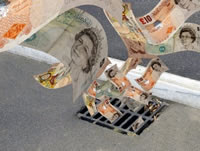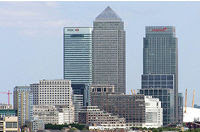 Before moving on from the debate surrounding recent EU budget negotiations, it's worth taking a moment to scrutinise the quite breathtaking hypocrisy exhibited on the subject by Labour's new shadow Europe minister Wayne David MP.
Before moving on from the debate surrounding recent EU budget negotiations, it's worth taking a moment to scrutinise the quite breathtaking hypocrisy exhibited on the subject by Labour's new shadow Europe minister Wayne David MP.In various reports about David Cameron's (increasingly dubious) efforts to reign in the EU's ever-expanding budget, Mr David offered quotes suggesting that a "sizeable" rise in the EU budget would be "against the national interest", saying: "I think we should dig our heels in and say that we want a freeze in the European Union [budget]."
Really? That's a turn up for the books.
Contradictions
Because not only did Mr David vote in November 2007 in favour of the European Union Finance Bill that approved the last EU budget deal increasing Britain's contributions by an extraordinary 60% through to 2013.
But the former MEP and leader of the Labour group in the European Parliament also in early 2008 voted to approve the Lisbon Treaty (and against the referendum his party promised voters), which is how Brussels is now attempting to justify the EU's need for yet more billions.
In particular, on 20 February 2008, Mr David voted in favour of the Lisbon Treaty's foreign, security and defence policy provisions that authorised the creation of the vastly expensive EU European External Action Service.
This is the new £5.8bn-a-year EU agency headed by the unelected Baroness Catherine Ashton that will be housed in a £10.5 million-a-year building, staffed in Brussels and worldwide by thousands of expensively-salaried EU officials, some of whom will enjoy being ferried about in one of the shiny new bullet-proof limos that will set back Europe's taxpayers £32m.
Regrets?
So for Mr David to turn around now and posture in favour of 'digging in our heels' and freezing Britain's contributions to the EU is all very well, so far as it goes.
But if he wants his apparent conversion to be taken seriously, Mr David first needs to express regret for his poor voting decisions in the past that have ccontributed to the situation Mr Cameron is today having to deal with.
Because if actions speak louder than words, Mr David's very evident past enthusiasm for gifting the EU large amounts of extra cash and voting EU institutions more powers will indicate to most that he's merely playing the sort of low-grade, party-political games that make the public very cynical about politicians and that ultimately only degrade our democracy.
So how about those regrets, Mr David? According to his website, he can be contacted at davidw@parliament.uk. Why not drop him a line and ask him? Especially if you live in his Caerphilly constituency.




 Statewatch
Statewatch












